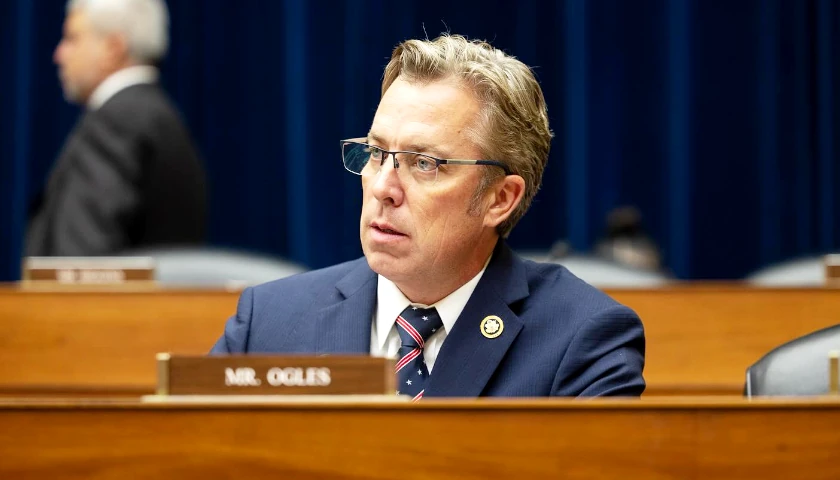Live from Music Row Tuesday morning on The Tennessee Star Report with Michael Patrick Leahy – broadcast on Nashville’s Talk Radio 98.3 and 1510 WLAC weekdays from 5:00 a.m. to 8:00 a.m. – host Leahy welcomed Tennessee Republican Party Chairman Scott Golden to the newsmaker line to detail party bylaws and clear up some misconceptions.
Leahy: We are joined on our newsmaker line now by our very good friend, the chairman of the Tennessee Republican Party, Scott Golden. Good morning, Scott.
Golden: Good morning. How are you doing?
Leahy: You have quite a set of responsibilities there, Scott. You’re the chairman of the Tennessee Republican Party. We’ve got this situation now developing all around the state in all elected offices, but particularly in the newly organized Fifth Congressional District which now includes parts of Davidson, parts of Wilson, parts of Williamson, all of Marshall, Maury, and Lewis Counties.
Looks like it could be a possible GOP pickup in the midterms 2020. Lots of people want to run for it, but there’s this little question of eligibility to be on the ballot in the August 2022 Republican primary. Can you unravel what those requirements are according to the bylaws of the Tennessee Republican Party?
Golden: Yes. That’s one of the things that we’ve been really proud of over the years that we’ve worked hard on. The original set of Tennessee Republican Party bylaws were written in the early 90s.
And one of the things that I did when I became chairman and we started looking at them, we actually kind of upped the standard. As you know, we don’t have closed primaries in the state. This isn’t a party registration state.
Tennessee state law requires each party, Democrat and Republican, to have a set of rules that determine who they are. So our thought was that, well, it’s if we might not be able to control who the voters want to vote for, but we can at least make sure that they have good quality candidates to vote from.
So one of the things we got the standards and they are right now, as we said, you are required to be active, which is spending time or money with the party or the state party being involved in that way.
And then voting in three out of the last four statewide primary elections. And those elections are, of course, the August primary. Of course, 2020 was Senator Hagerty, where he was nominated. 2018 was Governor Lee and Senator Blackburn when they were nominated.
2016 were members of Congress and state representative. And of course, March of 2020, which was President Trump’s reelect. Three out of those last four and be active to the party and then you are considered a bona fide Republican.
Leahy: So if a candidate claims to have voted in the March 2020 primary and the August 2020 primary and the voting records show that they did not vote, it sounds to me like that candidate would not be eligible under that standard to be considered bona fide. Do I have that right?
Golden: That is correct. If you are two out of four, then you are not bona fide to the standards. But there is a provision in our bylaws, which is if anybody wants some light reading for the evening they can go to tngop.org.
We have got a bylaw section. Article nine lays all of this out. But rule C in article nine says that, well, you can be vouched for. Somebody can liken it to the people of faith will understand this, that somebody takes away your failures, right?
Somebody can vouch for your ability to be a bona fide Republican. And then there’s a whole process for that. And then ultimately I and a group of our state executive committee board members make the final determination on eligibility.
Leahy: Walk us through the timeline on this for the possible challenges to the bona fide status of a particular candidate. When will that begin?
When would a review take place by the state executive committee? And when is the filing deadline for let’s take the U.S. House of Representatives as a starting point.
Golden: Okay. If we’re talking about the federal and state elections, that process begins on February 7th. A week from Monday, every candidate will be able to go grab a petition as soon as the petition is taken out from the state.
Then it takes two bona fide Republicans themselves from that district in order to protest. We call it a protest or challenge a candidate’s credentials. The great thing about our bylaws is that we assume that if you are getting a Republican petition, that you’ve read the bylaws and you know what the rules of our organization are.
Two bona fide Republicans themselves say, I don’t believe that this candidate meets that standard. Then the process will start from then from there. I will notify that candidate that they are being protested.
And while they are being protested, they will have the obligation to show us why we are wrong, because it happens. Different people that get protested, they don’t know your name that you’re listed under when you register to vote.
You may be Bill Smith, and everybody looks at Bill Smith and there’s not a Bill Smith registered. Well, yes, William Smith is registered and he’s a great Republican voter. So those types of things I can dismiss.
But if I find that there is evidence to hold a protest, then it will be on the candidate to gather the information to show us that we’re wrong, or it will be on the candidate to then gather the necessary letters of support showing that they should be on the ballot.
Leahy: When the letters of support come, what happens then to determine whether or not this person is vouched for? What does the state executive committee do at that time to make a go-no-go decision on that candidate?
Golden: We will have a conference call and take a vote. I have told every candidate throughout this cycle, be it local, which is going on now or state or congressional, which is coming up, is that, look.
The way that we have written these bylaws purpose of it is the people that can vouch for you are the people that are volunteering at your local political party. They’re not getting paid. They don’t want to run for Congress.
They wake up every day and say, how can I help good Republicans get elected? And I tell them all, these are the people that are going to be the ones that step up for you.
So you’ve had a year and a half of going to events and volunteering and helping. That’s what I encourage them to do.
Leahy: Let me ask you this question because I think this is a little different than my understanding.
Golden: Okay.
Leahy: I thought that the hearing as to the vouch ability of a candidate that fails to meet the three out of four GOP primary test, was that going to be public and there would be evidence presented and discussed in the vote taken at that time. But I think you just said that it would be held via a conference call.
Golden: Yes.
Leahy: Is that firm or will it be a public event?
Golden: The short answer is that it doesn’t have to be public. It is a meeting of the committee, Robert’s rules of order which say committees do not have to be public. I will say this is the first year we’ve ever done this. Our bylaws changed. It used to be, prior to this year it was solely the decision of myself, the chairman.
Leahy: And now you have a committee. Let me pose this question to you. Wouldn’t it be in the public interest to make this meeting public as opposed to a conference call?
Golden: Sure. But it may be, the scenario is that we may be dealing with hundreds of these and with multiple areas of the state and different groups to get around. It may not be practical to listen live or have a day where we do it.
Let me ask the SEC members if they feel comfortable with it being open. Listen. I am all for all the information being out there. I’m an open book. I think the system works better when everybody’s out there and everybody knows what’s going on.
Again, brand new determination. We’ve got more people involved than we’ve ever had.
Leahy: And expedience in these matters does matter. That’s true.
Golden: It does.
Leahy: The one that is controversial, of course, is the Fifth Congressional District. Would you possibly consider having that one public and the other ones considered by a conference call?
Golden: Sure. Let me talk to the members that are going to be involved as well. As one member of that committee, I think it’s great to be open.
Let everybody see what we’re doing. That’s where people have faith in the party and they can trust our decision-making.
Leahy: Chairman Scott Golden, thanks so much for joining us today. Come in-studio soon.
– – –
Tune in weekdays from 5:00 – 8:00 a.m. to the Tennessee Star Report with Michael Patrick Leahy on Talk Radio 98.3 FM WLAC 1510. Listen online at iHeart Radio.






[…] to Tennessee Republican Party Chairman Scott Golden, a qualifying GOP congressional candidate in the state must have voted in at least three of the […]